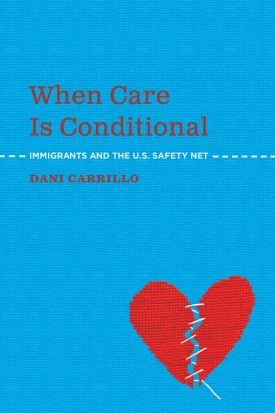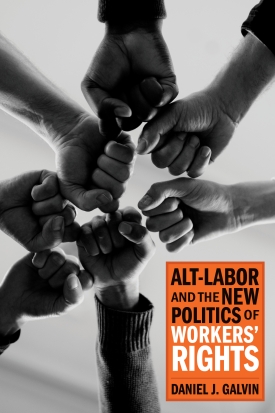On an occasional basis, the Foundation has one or two available office spaces and considers applications for short-term fellowships by scholars who are conducting research relevant to the Foundation’s priority areas. Visiting Researchers are provided with an office at the Foundation, computers and software, and library access. Applicants who reside outside of the greater New York City area may be provided with a partially-subsidized apartment near RSF, if available.
RSF publishes books on a wide variety of timely issues, with particular focus on topics related to our primary research programs: Behavioral Science and Decision Making in Context; Future of Work; Race, Ethnicity, and Immigration; and Social, Political, and Economic Inequality.
The Foundation is devoted exclusively to strengthening the methods, data, and theories of the social sciences as a means of improving social policies and currently sponsors a number of core programs, working groups, and special initiatives.
There is a long, rich history of journalists writing and reporting compellingly about topics related to the Russell Sage Foundation’s mission to “improve the social and living conditions in the United States.” The growth of economic inequality and its consequences, inequities in educational achievement and attainment, the impact of modern immigration, and recent racial tensions over urban policing are all examples of topics addressed by journalists that are central to RSF programs, and which have been the subject of study by RSF scholars and grantees.
The Russell Sage Foundation’s Visiting Scholars Program provides a unique opportunity for select scholars in the social, economic, political and behavioral sciences to pursue their data analysis and writing while in residence at the foundation’s headquarters in New York City.
The Russell Sage Foundation's fellowships include Visiting Scholars, Visiting Researchers, and Margaret Olivia Sage Scholars. Research carried out by visiting fellows constitutes an important part of the foundation’s ongoing effort to analyze and understand the complex and shifting nature of social and economic life in the United States.

When Care Is Conditional
About This Book
"When Care Is Conditional brings together trenchant analysis and deeply moving humanity to understand the barriers faced by Latinx immigrants and their strategies for well-being as they negotiate conditional care in the United States. Through nuanced research and the voices of ordinary people, Dani Carrillo shows how immigration policy, residential location, and, especially, gender shape who can get help, how much, and under what conditions. Beautifully written, this book is a must-read for scholars, policymakers, and philanthropists dedicated to advancing everyone’s well-being."
—IRENE BLOEMRAAD, Class of 1951 Professor of Sociology, University of California, Berkeley
"When Care Is Conditional is a critical reassessment of the failure of social protection in the United States through the lens of low-wage immigrants. Dani Carrillo offers a bottom-up examination of the patchwork of safety net institutions and the perennial difficulty of accessing them. In doing so, she disrupts the idyllic view of the suburbs and reveals how immigrant networks and civil society try to help fill in the gap. More than just a structural accounting, this book centers the importance of cultural narratives and stigmas in reinforcing 'conditional care' and in doing so helps us understand the dynamics of exclusion for all vulnerable racialized communities."
—SHANNON GLEESON, Edmund Ezra Day Professor and chair, Department of Labor Relations, Law, and History, Cornell University
"Dani Carrillo deftly weaves policy history with personal narratives of Latinx immigrants to lay bare how restrictive immigration policies undermine the well-being of families that too often are living in the shadows of our communities and society. The book comes at a critical time in our national, state, and local dialogue around immigration and social policy. When Care Is Conditional is critical reading for scholars, policymakers, and practitioners alike."
—SCOTT W. ALLARD, Associate Dean for Research and Engagement and Daniel J. Evans Endowed Professor of Social Policy, Evans School of Public Policy and Governance, University of Washington
From its inception, the public safety net in the United States has excluded many people because of their race, gendered roles, or other factors. As a result, they must prove their moral worthiness to get resources for themselves and their families. In When Care Is Conditional, sociologist Dani Carrillo reveals the ramifications of this conditional safety net by focusing on one particularly vulnerable population: undocumented immigrants.
Through in-depth interviews with Latinx immigrants in northern California, Carrillo examines three circumstances—place, gender, and immigration status—that intersect to influence an individual’s access to health care, food assistance, and other benefits. She demonstrates that place of residence affects undocumented immigrants’ ability to get care since more services are available in urban areas, where many immigrants cannot afford to live, than suburban areas, where public transportation is limited. She also shows that while both men and women who are undocumented have difficulty obtaining care, men often confront more challenges. Undocumented women who are pregnant or mothers are eligible for some government safety net programs and rely on informal coethnic networks or a “guiding figure”—a relative, friend, neighbor, or coworker—who explains how to get care and makes them feel confident in accessing it. Most undocumented men, in contrast, are not eligible for public programs except in a medical emergency and often lack someone to guide them directly to care. Men sometimes steer one another to jobs through worker centers—where they may learn about various services and take advantage of those that increase their employability, like English or computer classes—but a culture of masculinity leads them to downplay medical problems and seek health care only in a crisis.
As undocumented immigrants navigate this exclusionary system, Carrillo finds that they resist the rhetoric stigmatizing them as lawbreakers. Dismissing the importance of “papers” and highlighting their work ethic, they question the fairness of U.S. immigration policies and challenge ideas about who deserves care.
Carrillo offers concrete recommendations, such as improving labor conditions and reexamining benefit eligibility, to increase access to care for not only undocumented immigrants but also people who have been excluded because of their race, criminal record, gender identity, sexual orientation, or disability. She argues that working with and across populations creates a powerful form of solidarity in advocating for inclusive care.
When Care Is Conditional provides compelling insights into how safety net and immigration policies intersect to affect people’s everyday lives and calls for a cultural shift so that the United States can provide unconditional care for all.
DANI CARRILLO is a senior researcher and civic technologist.
RSF Journal
View Book Series
Sign Up For Our Mailing List
Apply For Funding

Alt-Labor and the New Politics of Workers’ Rights
About This Book
Selected as a 2024 Noteworthy Book in Industrial Relations and Labor Economics Princeton University Industrial Relations Section
"Daniel Galvin offers readers a superbly incisive, empirically eclectic, narratively compelling analysis of the contemporary politics of workers’ rights. Alt-Labor and the New Politics of Workers’ Rights perceptively charts and contextualizes striking shifts in the American political economy that have profoundly altered the experiences of low-wage workers. What’s more is that Galvin brilliantly centers the agency and power of marginalized workers and the organizations that advance their interests in the face of significant and ongoing structural challenges. Scholars of American politics, students, organizers, and anyone who cares about the fate of American workers will find insight and inspiration in Galvin’s skillful description and analyses of the politics of alt-labor."
—JAMILA MICHENER, associate professor of government and public policy and senior associate dean of public engagement, Brooks School of Public Policy, Cornell University
"The relentless decline of U.S. unions in recent decades is both a cause and a consequence of the devolution of the bedrock New Deal–era labor law that institutionalized collective bargaining rights for broad swaths of the nation’s labor force. In this lucid, deeply researched study, Daniel Galvin analyzes the rapid expansion of state and local laws governing minimum wages, paid leave, and other conditions of employment, and exposes the challenges that shift presents for the ‘alt-labor’ groups that are increasingly leading the fight for workers’ rights."
—RUTH MILKMAN, Distinguished Professor of Sociology, School of Labor and Urban Studies and the Graduate Center, City University of New York
"Dan Galvin’s book adds exponentially to the scholarship on worker centers and ‘alt-labor’ and so much more. It masterfully traces the shift from labor law to employment law, the consequential turn toward policy and enforcement at the state and local levels, and the strategic capacity worker centers have had to build to carry it out. It thoughtfully engages the puzzle of how organizations with so little have managed to accomplish so much. Alt-Labor and the New Politics of Workers’ Rights is deeply researched, theoretically rich, full of powerful insight, and beautifully written to boot."
—JANICE FINE, professor, Rutgers School of Management and Labor Relations and Workplace Justice Lab@RU
Over the last half century, two major developments have transformed the nature of workers’ rights and altered the pathways available to low-wage workers to combat their exploitation. First, while national labor law, which regulates unionization and collective bargaining, has grown increasingly ineffective, employment laws establishing minimal workplace standards have proliferated at the state and local levels. Second, as labor unions have declined, a diversity of small, under-resourced nonprofit "alt-labor" groups have emerged in locations across the United States to organize and support marginalized workers. In Alt-Labor and the New Politics of Workers’ Rights, political scientist Daniel J. Galvin draws on rich data and extensive interviews to examine the links between these developments. With nuance and insight, Galvin explains how alt-labor groups are finding creative ways to help their members while navigating the many organizational challenges and structural constraints they face in this new context.
Alt-labor groups have long offered their members services and organizing opportunities to contest their unfair treatment on the job. But many groups have grown frustrated by the limited impact of these traditional strategies and have turned to public policy to scale up their work. They have successfully led campaigns to combat wage theft, raise the minimum wage, improve working conditions, strengthen immigrants’ rights, and more. These successes present something of a puzzle: relative to their larger, wealthier, and better-connected opponents, alt-labor groups are small, poor, and weak. Their members are primarily low-wage immigrant workers and workers of color who are often socially, economically, and politically marginalized. With few exceptions, the groups lack large dues-paying memberships and are dependent on philanthropic foundations and other unpredictable sources of funding. How, given their myriad challenges, have alt-labor groups managed to make gains for their members?
Galvin reveals that alt-labor groups are leveraging their deep roots in local communities, their unique position in the labor movement, and the flexibility of their organizational forms to build their collective power and extend their reach. A growing number of groups have also become more politically engaged and have set out to alter their political environments by cultivating more engaged citizens, influencing candidate selection processes, and expanding government capacities. These efforts seek to enhance alt-labor groups’ probabilities of success in the near term while incrementally shifting the balance of power over the long term.
Alt-Labor and the New Politics of Workers’ Rights comprehensively details alt-labor’s turn to policy and politics, provides compelling insights into the dilemmas the groups now face, and illuminates how their efforts have both invigorated and complicated the American labor movement.
DANIEL J. GALVIN is professor of political science at Northwestern University and faculty fellow at the Institute for Policy Research.
Awards
2024 Noteworthy Book in Industrial Relations and Labor Economics
Princeton University Industrial Relations Section
